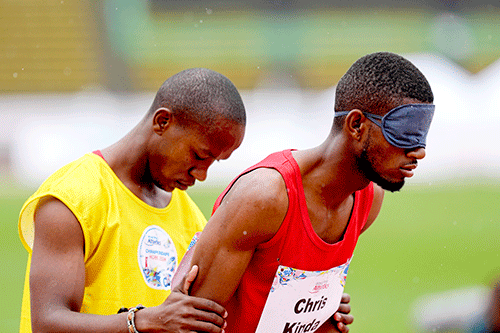As the Para-Athletics World Championships continue in Kobe, Japan, guide runner Kelvin Riwaldo Goagoseb shared his invaluable experience.
Visually-impaired sprinters race with a guide, who is attached to them with a band at the wrist or hand.
“The guide’s role is to provide everything a runner with vision has, from informing the runner how far they are on the track, to where they are in comparison to other racers, or what they must do to win. The guide’s role is a crucial one,” said Goagoseb, who is a guide runner for T11 Para-athlete Chris Kinda.
The duo recently ran a World Champions time of 52.53 seconds in the 400m T11 event in Kobe, a feeling expressed by Goagoseb as immeasurable.
He said they hoped for a podium finish, but did not expect to win a gold medal. He explained that they are in the process of building for the future, and the unexpected gold medal just adds to their confidence. “I had mixed feelings before the race. I informed the coach that I was nervous, and she advised me to stick to the plan.
“Being a guide runner comes from the heart, I would advise people to help each other in making each other’s dreams come true, and most of all to love each other. It’s also important to stay humble because there are many children looking up to us in the world,” he said.
Goagoseb added that there was a time that guide runners did not get a medal for their performances. “This changed at the 2012 Paralympic Games, where guide runners received medals and financial rewards for the first time for assisting with podium finishes.
“We are still often overlooked, whilst being of importance to the athlete: setting up the blocks and placing the athlete’s hands, hips and feet in the right position. You only run a golden race when you work together as a team,” he said.
The chief administrator of the Namibia Sports Commission Freddy Mwiya expressed pride in the athletes’ achievements. He said the athletes are all equal in their
achievements. “There is equal treatment and per the reward policy, the athletes will receive their rewards for their performances,” said Mwiya.
Namibia is represented by 11 para-athletes and seven guides in the championships which started on 17 May till the 25th.
Highlights of the competition include yesterday morning’s performance in which Lahja Ishitile and guide Sem Shimanda set an African record in the T11 100 metre heats, finishing second in a time of 12.39 seconds. Johanna Benson made it to the finals finishing in third position in her 100m T37 heats, and will compete today.
In the afternoon, Johannes Nambala ended in sixth position in the men’s 100m T13 race, running a season’s best of 11.29 seconds. Algeria’s Skander Djamil Athmani took first place with a time of 10.44 seconds in what is a champions record, followed in second and third respectively by Japan’s Shuta Kawakami in 10.70 seconds and Norway’s Salum Kashafali in a time of 10.79 seconds. Nambala will once again compete tomorrow in his favourite 400m race.
Namibia’s 17-year-old Lahja Ipinge and her guide Paulus Phillipus were disqualified because the guide crossed the finish line before the athlete, after ending second in heat two of the 400m T12 race.
Brazil’s Lorraine Gomes de Aquiar advanced to the final with a time of 59.29 seconds. Ipinge and Phillipus will compete in the 100m T12 heats tomorrow.
Denzel Namene finished seventh in the men’s 100m T44 final with a time of 12.41 seconds. South Africa’s Mpumelelo Mhlongo won gold with a time of 11.34 seconds, Malaysia’s Eddy Bernard claimed silver, and Sri Lanka’s Indika Gamage took bronze. -lmupetami@nepc.com.na



